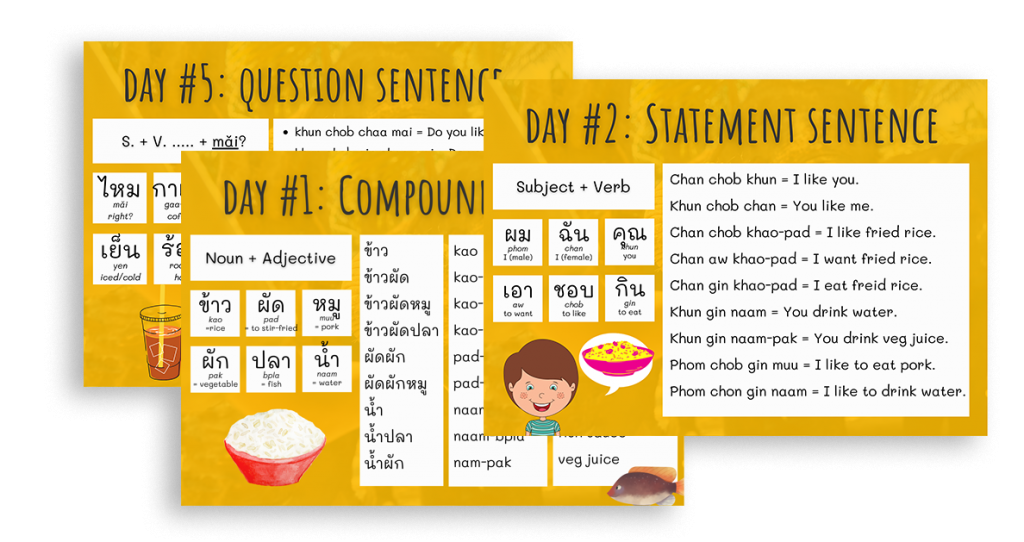You might already know the word มากกว่า (mâak-gwàa) as “more than” but there are more to learn. Listen to my Thai podcast and learn from this blog post.
Overview
- Introduction
- Case#1: กว่า (gwàa)
- Case#2: ขึ้น (kûen) / ลง (long)
To make a comparison in Thai
In Thai, there are a few words that can be used as “more than”. It depends on what you’re comparing. Here are the 2 cases:
- Case 1: When you compare two different things
For example, My hair is longer than yours.
(You compare the length of your hair to your friend’s.) - Case 2: When you compare the same thing at different times
For example, you compare your hair at the moment to your hair 5 months ago.
(You compare the length of your hair to the same one before)
Case 1: Compare different things
The keyword is กว่า (gwàa) and it can be used for both adjectives and adverbs. Now let’s see different ways to use this word as “more than”.
Basically, you can put กว่า (gwàa) to modify the adjective and compare 2 different things.
For example,
เธอมีเงินเยอะกว่าฉัน
ter mee ngern yúh gwàa chăn
= You have more money than me.
ผมเธอยาวกว่าผมฉัน
pŏm ter yaao gwàa pŏm chăn
= Your hair is longer than my hair.
ร้านอาหารร้านนี้ถูกกว่าในห้าง
ráan aa-hăan ráan née tòok gwàa nai hâang
= This restaurant is cheaper than the one in the mall.
โทรศัพท์ยี่ห้อนี้ดีกว่าไอโฟน
toh-rá-sàp yêe-hôr née dee gwàa iPhone.
= This phone brand is better than iPhone.
You can also put กว่า (gwàa) to modify the adverb of the sentence.
For example,
เขาร้องเพลงเพราะกว่าฉัน
kăo róng pleng prór gwàa chăn
= he/she sings more beautifully than me.
เธออ่านภาษาไทยเก่งกว่าเขา
ter àan paa-săa tai gèng gwàa kăo
= You read Thai better than her.
ฉันเดินช้ากว่าพ่อ
chăn dern cháa gwàa pôr
= I walk slower than my dad.
In case you want to say “I prefer something to another thing”, Thai people literally say “I like this more than that”.
For example,
ฉันชอบไอศกรีมช็อกโกแลตมากกว่าไอศรีมวนิลา
chăn chôp ai-sà-greem chók-goh-láet mâak gwàa ai-sà-greem wá-ní laa
=I prefer chocolate ice cream to vanilla ice cream.
ฉันชอบหมามากกว่าแมว
chăn chôp măa mâak gwàa maew
= I prefer dogs to cats.
I talked about prefer something to another thing previously. Now, if you want to say “I prefer doing this to doing that” (with a verb), then you will use อยาก yàak (to want) instead of ชอบ chôb (to like).
For example,
ฉันอยากไปทะเลมากกว่าไปภูเขา
chăn yàak bpai tá-lay mâak gwàa bpai poo kăo
= I prefer going to the beach (to going to the mountains)
ฉันอยากเจอเธอตอนหกโมงมากกว่าตอนหนึ่งทุ่ม
chăn yàak jer ter dton hòk mohng mâak gwâa dton nèung tûm
= I prefer meeting you at 6 pm (to at 7 pm).
If you want to sound like a Thai, you need to learn particles. We use the word ดีกว่า (dii-gwàa) to put the end of the sentence and it works as “I prefer” when speaking casually.
For example,
แฮรี่พอตเตอร์ดีกว่า
Harry Potter dii-gwàa
= I prefer Harry Potter. (to other movies)
ไปร้านอาหารญี่ปุ่นดีกว่า
pai ráan-aa-hǎan yîi-pùn dii-gwàa
= I prefer going to the Japanese restaurant. (to others)

Join 5-day Easy Thai challenge
Get a series of short lessons via email to master basic Thai sentences. Best for beginners.
Case 2: Compare the same thing at different times
If we are talking/comparing the same thing, person, animal, etc at different times or stages, we no longer use กว่า gwàa. Instead, there are two words that you need to learn.
- ขึ้น kêun (to increase) used with adjectives and adverbs that give the sense higher number, bigger or more intense.
- ลง long (to decrease) used with adjectives and adverbs that give the sense lower number, small or less intense.
ฉันอ้วนขึ้น
chăn ûuan kêun
= I got fetter (I gained weight)
ฉันผอมลง
chăn pǒorm long
= I got skinnier (I lost weight)
ฉันอ่านภาษาไทยเก่งขึ้น
chăn àan paa-săa tai gèng kêun
= I read Thai better.
ฉันอ่านภาษาไทยแย่ลง
chăn àan paa-săa tai yâe long
= I speak Thai worse. (My reading Thai skill is worse)
คุณแข็งแรงขึ้นมาก
kun kăeng raeng kêun mâak
= You’re much stronger.
คุณอ่อนแอลงมาก
kun òn ae long mâak
= You’re much weaker.
พูดดังขึ้นอีกได้ไหม
pôot dang kêun èek dâai măi
= Can you speak louder?
พูดเบาลงอีกได้ไหม
pôot bao long èek dâai măi
= Can you speak less loud?
You can out the word กว่าเดิม (gwàa-duem) as “than before” at the end of the sentence, however, it’s not necessary because the word ขึ้น(kûen) or ลง(long) already implies the comparison at different times.
That’s it!
I hope you enjoy this lesson and podcast to improve your conversation skills. If you have any questions or want to recommend me new topics for me to teach, please feel free to write me at info@bananathaischool.com.
Much love,
Kru Smuk



